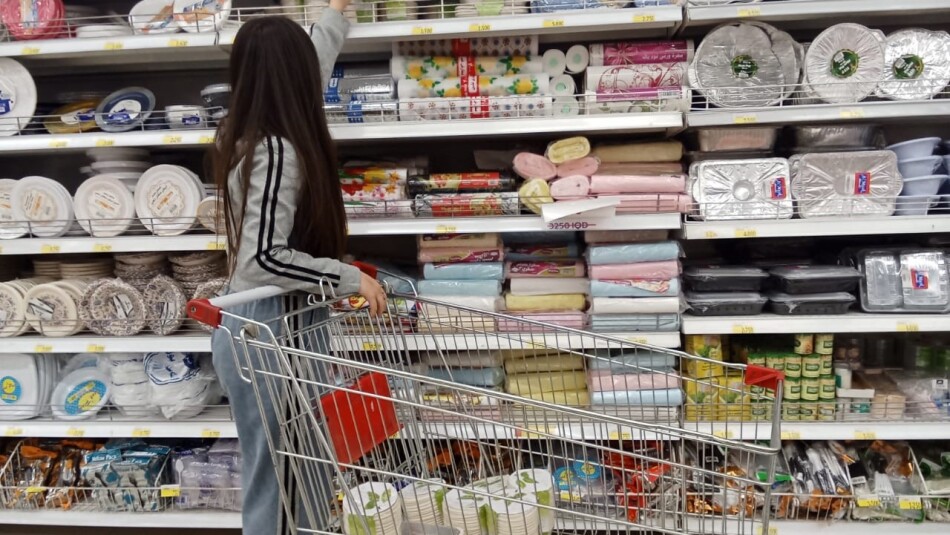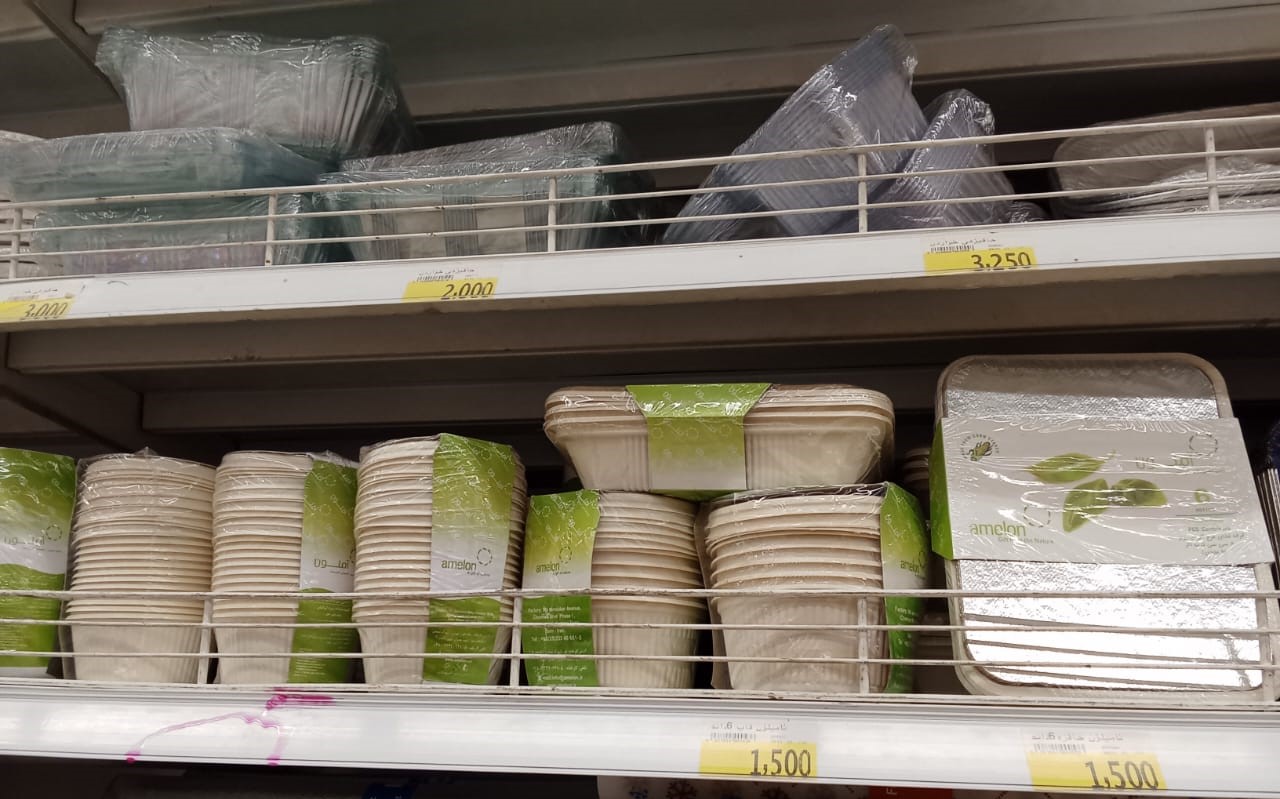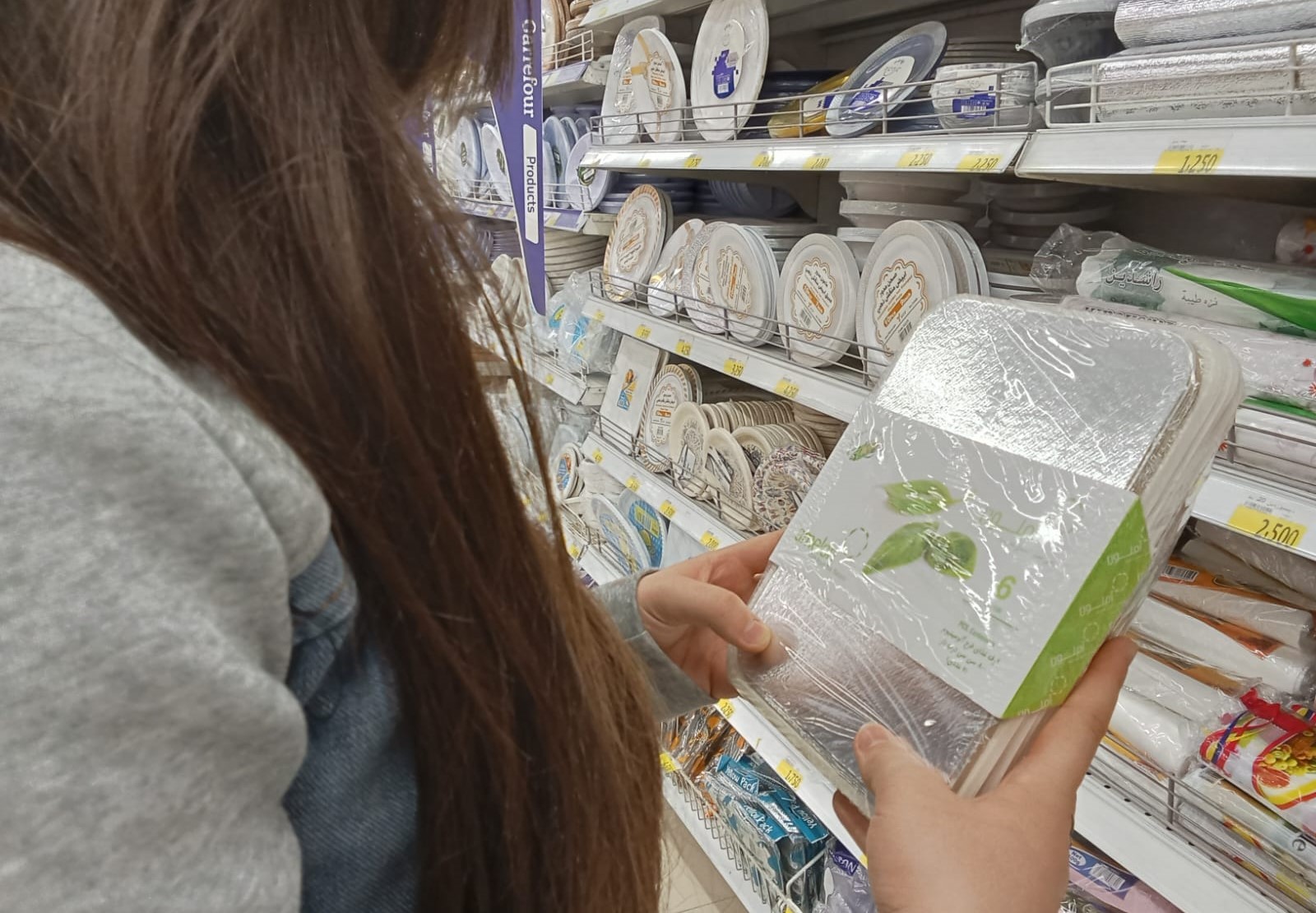
Spoons and plates made from cornstarch are environmentally friendly and save people from the negative effects of plastic. These products are very safe and decompose quickly, blending with nature after becoming waste.
Eco-friendly tableware is now available in the markets of the Kurdistan Region. The owner of this idea is Ali Saleh, who previously worked in various fields related to the environment with the aim of educating people and urging them to protect the environment. This led him to think about turning his idea into practical steps, and the best option for him was to offer alternatives to plastic.
Many household items for daily use are now made of plastic, such as water bottles, buckets, spoons, pots, and pans, which negatively affect the environment and public health.
"The idea of making utensils and other supplies from cornstarch is an extension of the path I took to educate society. This project is the first practical step to protect people, soil, and the environment," said Ali Saleh, Deputy Director of (K-Bond) Company and the owner of the idea of environmentally friendly tableware called "Amilon". All he cares about is protecting the environment in the Kurdistan Region of Iraq KRI, but he was "forced" to move his factory to another country.
The fight against the plastic invasion, which the United Nations is constantly encouraging, is gaining momentum in the world, where 460 million tons of plastic are produced annually. A recent report by the United Nations Environment Program warned that by 2050, the oceans may contain more plastic than fish unless people stop using single-use plastics, such as plastic bags and bottles.
An Unequal Battle
The initiative launched by Ali Saleh, despite its limited scope compared to the huge amounts of plastic, looks forward with hope to its success.
"After eight years of service and gaining experience, I can say that people's welcome of the initiative is not at the required level, some do not believe in it at all," but what matters to Ali is that Amilon products are made from cornstarch and comply with modern international standards.
The factory began pumping its products into the markets in 2016, and they include alternatives to all disposable tableware, in different shapes and sizes. Their prices generally range between 1,000-1,500 Iraqi dinars IQD.
In addition to the low cost of production and the ease of importing them from abroad, the operation of many local factories that produce travel tools and supplies made of plastic or nylon at competitve prices makes demand high for it. According to (KirkukNow) follow-ups, the price of plastic travel plates or cups in the KRI does not reach a quarter of their price in Europe.
"The presence of these plastic supplies in the markets of Kurdistan is a disaster because until now, plastic is not tested at border crossings," said Lashkir Hamid, a food engineer.
The use of plastic travel products has two negative effects. The first is from the health side because the chemicals used in their manufacture interact with the foods placed in them and lead to disease. It also negatively affects the elements of water, air, and soil, leading to their pollution, as plastic materials take hundreds of years to decompose in the soil.
The majority of plastic containers available in the market are made of recycled plastic, which makes them contain some heavy metals such as cadmium and lead. Most of the plastic containers in which milk is stored are made from medical waste.
Hamid himself conducted laboratory tests and found that the percentage of heavy metals in these plastic products is 100% higher than the Codex standard.
Codex is a global standard applied all over the world to determine the percentage of metals in products, which if exceeded, cause health damage to humans.

Abdul Razzaq Khailani, the spokesman for the Kurdistan Region Environmental Protection Authority, showed support for environmentally friendly products and stressed that the authority supports "banning single-use plastics and preventing their import or imposing heavy taxes on them to avoid their easy access to the consumer."
In 2021, the Kurdistan Nature Organization, concerned with the environment, submitted a draft law to the Iraqi Kurdistan Parliament stipulating an increase in taxes on imported plastic by 100% and on locally produced plastic by 75%. However, the draft law was not included on the parliament's agenda until the end of the fifth parliamentary session.
"The best way to reduce the use of plastic products is to increase taxes so that their prices are higher for the consumer, in addition to strengthening quality control at border crossings and preventing the import of low-quality plastic products that affect human health and pollute the environment," Hamid says.
For a healthy table
Galawezh Mahmoud, a 56-year-old woman, decided to stop using disposable plastic after hearing about the health risks of plastic yogurt buckets and containers. Now she searches in supermarket refrigerators for milk stored in environmentally friendly containers.
"Previously, I used to buy domestic fresh yogurt that was stored in plastic buckets, but after I learned about the health and environmental damage resulting from using them, I stopped buying them and started moving from one store to another in search of fresh yogurt that is stored in environmentally friendly containers, which can be identified by their color," according to Mahmoud.
She encourages people to stop using plastic. "Making this decision is easy and we must prioritize health and the environment." SHe also pushed her children to stop using plastic because she considers harming the environment a crime.
Products made from cornstarch can withstand temperatures up to 100 degrees Celsius without undergoing chemical reactions or physical changes. Saleh fears that products made from plastic materials will be sold to citizens under the name of products made from cornstarch, with the aim of reducing the shape and design.
"Unfortunately, some traders copy our products and make similar ones from recycled plastic materials and sell them as natural and eco-friendly."
The United Nations seeks to reduce plastic pollution worldwide up to 80% by 2040, through three methods and transformations: promoting reuse options, including refillable bottles, recycling and redirection, and diversification by deliberately replacing products such as plastic wrappers, bags, and ready-made products with containers made from alternative biodegradable materials such as paper.
Salar Faeq (20 years old) works within an environmental team to spread awareness among people on social media to urge them not to use disposable plastic utensils and tools.
"We must reorganize our lifestyle and move away from using plastic of all kinds. This method will save you money and prevent environmental pollution with plastic waste."

Disposable dishes made from cornstarch in one of the markets of Sulaymaniyah, Sulaymaniyah, December 2024. Ghamgin Mohammed
The environment is a shared concern, and it is everyone's duty to protect it. On this basis, Salar works and encourages the locals to use environmentally friendly products.
Plastic affects the fertilization process, hormonal activities, and the brain, and burning plastic waste pollutes the air, according to warnings from the United Nations. UN statistics indicate that more than 400 million tons of plastic waste are produced annually in the world, half of which is suitable for single use and less than 10% is recyclable.
Plastic dishes contain toxic chemicals such as (epichlorohydrin and bisphenol) that dissolve in water and enter the human body, leading to weak immunity and low levels of vitamins. They also cause lung cancer, kidney failure, and reproductive system diseases. In addition, they lead to increased secretion of the hormone estrogen, which leads to infertility in women, Hamid stated.
Regarding plastic alternatives, Lashkar said that "travel dishes made from cornstarch are very healthy and suitable for use because they do not corrode, and their components do not mix with the foods placed in them, thus they do not cause health damage."
He pointed out that from an environmental perspective, they decompose within a short period, and their elements return to the soil. A large portion of plastic waste in Iraq is burned, and there is a direct relationship between air pollution and plastic pollution.
IQAir, a Swiss company working in the field of air quality technology, stated Iraq's air is among the "most polluted" in the world.
The Kurdistan Region Environmental Protection and Improvement Authority is aware of the damage caused by plastic waste, but all it can do is spread awareness to warn people of the dangers of using plastic and resort to environmentally friendly products.
"We have repeatedly tried to ban the import of single-use plastic products. We sent official letters to customs and the responsible authorities, but we did not find any listening ears, under the pretext that preventing their entry or increasing the taxes imposed on their import would weaken trade activity," the authority's spokesman says.
Many obstacles and limited support
The challenges that Saleh faced were greater than the support he received, so he decided to move his factory to neighboring Iran, where his products are now manufactured there and marketed in the markets of the KRI.
The owner of the Amilon project for plates and tableware said, "We thought a lot about establishing a factory in Kurdistan, and we are planning to do so, but due to the lack of support, we have not been able to take this step yet."
He added that while his products serve the environment, they create obstacles for him and do not offer the necessary support within the region.
According to statistics published by the Sulaymaniyah Chamber of Commerce, 4,320 factories have been registered in the Kurdistan Region, 1,034 of which are located in Sulaymaniyah Northern Province, but only 30 of them are still operating, and the rest have stopped their activities due to incurred losses.
Aram Baban, the head of the Industry Committee in the Sulaymaniyah Chamber of Commerce, agrees with Ali Salih. "The investment situation in the Kurdistan Region is deplorable, and the government does not support local production. Officials are always conspiring against local production because they promised neighboring countries not to allow industry in the region to develop, so that the people of the region become consumers."
He explained that the goal of opening any factory in the Kurdistan Region is to market its products throughout Iraq, but the regional government prevents their export to the central and southern regions of Iraq, "which leads to factory owners incurring huge losses."
One third of Iraq's factories are located in Sulaymaniyah and constitute 61% of the factories in the Kurdistan Region, so Sulaymaniyah ranks first in manufacturing across Iraq, according to statistics from the Sulaymaniyah Investment Directorate.
Aziz Saeed, the Director General of Investment in Sulaymaniyah, believes that the conditions in the Kurdistan Region are 100 percent suitable for investment, due to the facilities available in terms of granting licenses, tax exemption for 10 years, granting plots of land for projects at encouraging prices, not imposing taxes on importing laboratory equipment and devices, and the raw materials used in factories are exempt from taxes for five years.
The Kurdistan Region Investment Law No. 4 of 2006 stipulates the encouragement and development of the sectors of industry, agriculture, tourism, trade, education, health, and others.
He stresses that the law needs to be amended by changing some of its paragraphs to encourage investment, for example, granting more privileges to investors and reducing the electricity bill, in addition to providing facilities for marketing and exporting products and preventing the import of similar products to avoid investors being exposed to losses.